Best of #econtwitter - Week of November 22, 2020 (1/2)
Nov 23, 2020
Welcome readers old and new to this week’s edition of the Best of Econtwitter. Thanks to those sharing suggestions, over email or on Twitter @just_economics.
There was a very high quantity of good content this week, so we’ll have a special two-part edition this week.
Paper summaries

Jon Fiva@JFiva
Does biology drive child penalties? Check out this AER:Insights paper with data from Denmark. Figure 1 is striking:


AEA Journals @AEAjournals
Forthcoming in AER: Insights: "Does Biology Drive Child Penalties? Evidence from Biological and Adoptive Families" by Henrik Kleven, Camille Landais, and Jakob Egholt Søgaard. https://t.co/Nw3q3HYQow
4:52 PM · Nov 17, 2020
2 Reposts · 11 Likes

Stefanie Stantcheva@S_Stantcheva
[1/N] 📕✏️New paper! How well do people know their social position relative to others in society? How does their social position shape their views on fairness? Does their income history shape views? With @okoctk & @KBHvidberg Paper here: scholar.harvard.edu/files/stantche…
Summary thread ⬇️

12:21 PM · Nov 17, 2020
122 Reposts · 452 Likes

Lionel Page@page_eco
🚨New paper!🚨
Do market prices incorporate public information properly?
Setting: betting markets on soccer matches
Natural experiment: knife-edge situations when a shot hits a post
👉Prices incorporate surprisingly quickly & efficiently public info 1/
nyuad.nyu.edu/content/dam/ny…
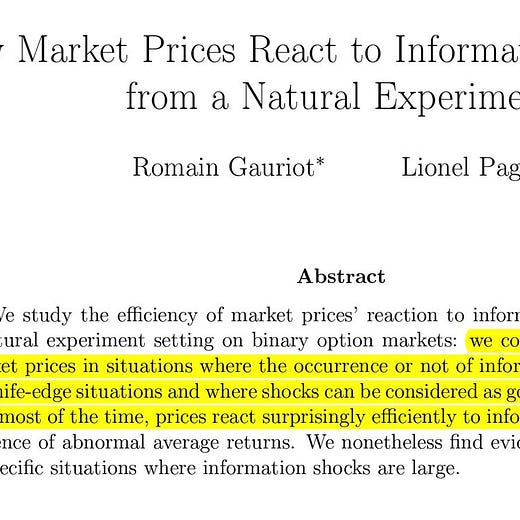
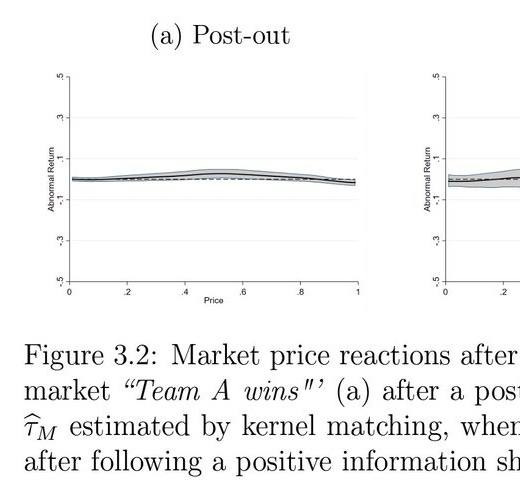
12:29 PM · Nov 17, 2020
5 Reposts · 21 Likes

Paddy Carter@CarterPaddy
Extraordinary estimates of the impact of Chinese development finance, forthcoming in AEJ Policy. So large I struggle to believe them. Is Chinese dev finance very different from others, or should this move our beliefs about development finance in general?
aeaweb.org
Aid, China, and Growth: Evidence from a New Global Development Finance Dataset

10:20 AM · Nov 19, 2020
4 Reposts · 27 Likes
^interesting discussion in replies

Alexander Berger@albrgr
More evidence of roughly log normal cost effectiveness estimates, from climate in this case:


Amanda Glassman @glassmanamanda
What Do We Know about the Cost-Effectiveness of #Aid Spent on #Climate Mitigation? @mattjuden @EconMitch @CGDev https://t.co/4k1G2NXxoL - good to connect this work with the new @IDinsight @DanStein_econ @nickwolfparker #givinggreen initiative
4:21 PM · Nov 19, 2020
3 Likes

Kevin Chen@jiafengchen42
New short paper documenting an easy recipe for incorporating machine learning into linear IV to boost instrument strength *essentially for free*: arxiv.org/abs/2011.06158
Joint work with Daniel Chen and @econ_greg
#EconTwitter #CausalTwitter
arxiv.org
Mostly Harmless Machine Learning: Learning Optimal Instruments in Linear IV Models

6:36 PM · Nov 17, 2020
44 Reposts · 184 Likes

scott cunningham@causalinf
This new paper in economic history by Tianyi Wang (PhD Pitt; postdoc Copenhagen) is timely and timeless. He uses variation in a racist populist show caused by topological factors to estimate the effect of the show on voteshare, as well as increase pro-Nazi groups. 1/n
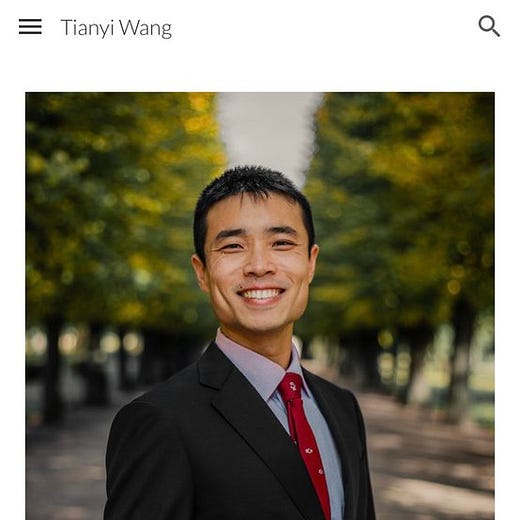
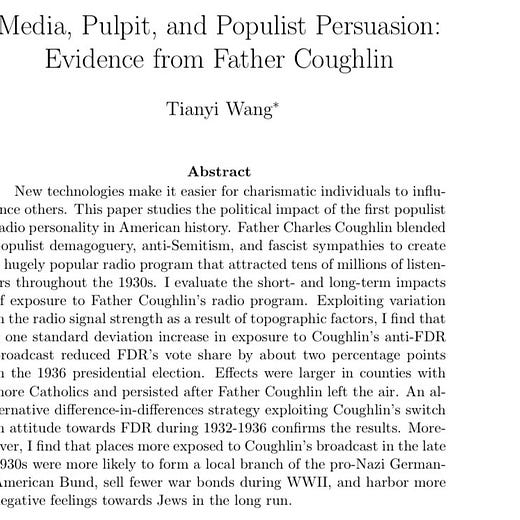
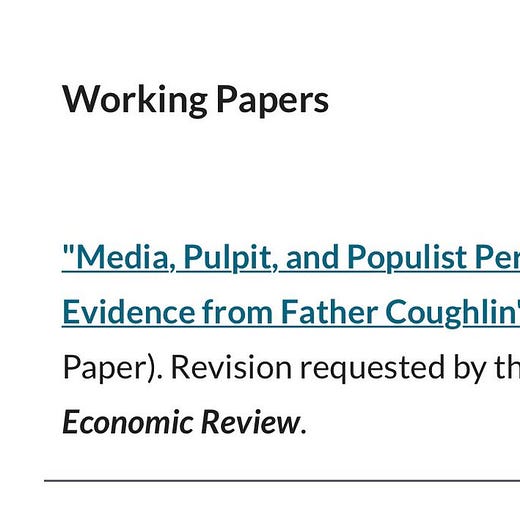
11:12 PM · Nov 14, 2020
126 Reposts · 623 Likes
Job market papers

Ebehi@Ebehi_Iyoha
Hi #EconTwitter!
I'm a PhD candidate at @VanderbiltEcon specializing in IO, trade and networks.
I'm on the job market this year and would like to tell you about my job market paper: ebehii.github.io/publication/iy…
🚨 JMP thread 🚨

4:24 AM · Nov 21, 2020
93 Reposts · 340 Likes

Bobby W Chung@BobbyWYChung
Hi #econjobmarket #EconTwitter, my JMP on occupational licensing can be found here: sites.google.com/view/bobbywchu…
Spiel: (1/N)
sites.google.com
Bobby W. Chung | Academic Site - Working Papers

5:36 PM · Nov 18, 2020
13 Reposts · 63 Likes

Jennifer Withrow@withrowjenny
Thx @jenniferdoleac! In my JMP, inspired by a 1920 USDA report of a similar title, I create a new dataset of women linked across censuses to show how gender segregation in farming, and the problems caused by it, led to an exodus of women during the 1920-1940 US farm crisis. (1/7)

Jennifer Doleac @jenniferdoleac
Jennifer Withrow
JMP: "'The Farm Woman’s Problem': Farm Crisis in the U.S. South and Migration to the City, 1920-1940"
Website: https://t.co/i3yn5M84Bc https://t.co/QNZ66h4grX
6:09 PM · Nov 18, 2020
32 Reposts · 129 Likes

John Cawley@cawley_john
Katherine's JMP examines the effect of state influenza vaccination requirements for nursing home workers and residents; she finds that they increase take-up of vacc by 4-6% and reduce Dx of flu-like illness by 11-15%. 2/8
6:58 PM · Nov 20, 2020
3 Likes
Public goods

Peter Hull@autoregress
By popular request, I've posted the slides from last week's lecture on Shift-Share IV methods here:
dropbox.com/s/m7uy42q7lire…
Thanks again to @arindube for the opportunity to develop these for his course. Questions/comments/other guest lecture opportunities are all very welcome!
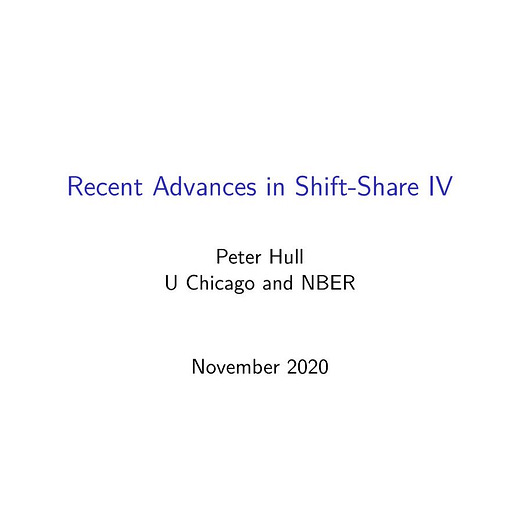
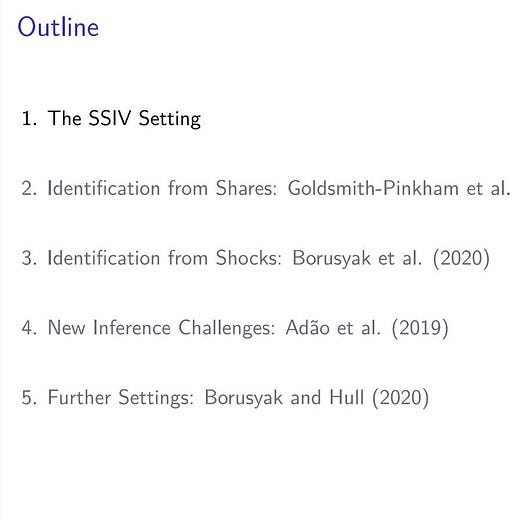
5:00 PM · Nov 18, 2020
89 Reposts · 460 Likes

Peter Zorn@_peterzorn
Fantastic! Let me add my 1-slide overview on German administrative micro-level price data: https://t.co/etOxcpbonK

1:12 PM · Nov 18, 2020
1 Repost · 18 Likes

Elif Bike Osun@elifbikeosun
Running an experiment on MTurk with 1,000 subjects calls for my first 🧵
I learned a lot during this process and want to share some tips for those who are planning to run a large-scale experiment. (1/n) #ExperimentalEconomics #EconTwitter
8:33 PM · Nov 22, 2020
6 Reposts · 25 Likes
Interesting threads/discussions

Steven Hamilton@SHamiltonian
The switch from stamp duty (housing transaction tax) to land tax is often framed as a no-brainer. But there’s an underdiscussed trade-off that goes to the heart of a key issue in optimal taxation, which itself has been understudied. A wonkish thread. 1/10
smh.com.au
A duty to reform: NSW takes ‘path of least resistance’ with tax switch

1:37 AM · Nov 21, 2020
16 Reposts · 60 Likes

Paul Novosad@paulnovosad
This should never happen, what a waste of everyone’s time and energy.
If it got this far in the process, publish it and let the scientific community decide how to interpret it.
Published papers don’t have to be right (most aren’t)— they just have to be worth thinking about.

Wilhelmina van Dijk @WillavanDijk
A paper rejection after two rounds of R&R hurts.
2:22 PM · Nov 19, 2020
6 Reposts · 177 Likes

Paul Goldsmith-Pinkham@paulgp
@causalinf @imbernomics @nberpubs i think the better way to view it is as a big reading group / conference that got started in the 80s by some powerful people and slowly took over the profession -- the starting tastes and preferences in the 80s had a big influence.
3:23 PM · Nov 17, 2020
1 Repost · 2 Likes
^in reference to NBER

Nick HK@nickchk
If you look at autocorrelated data, pick any random day, and look for a break in linear trend on that day, you will find a statistically significant break a ludicrous amount of the time. In this random AR(1) data with delta = .8, I reject the null at 95% about half the time.

8:19 AM · Nov 19, 2020
85 Reposts · 548 Likes

Ben Golub@ben_golub
Kim Border was an extraordinarily generous person, an encyclopedic store of knowledge, and an amazing producer of public goods. One of my first economics teachers.
I'll use this thread to share a few favorite examples of his writings. I hope some others do as well.
1/

PJ Healy @pauljhealy
I'm saddened to learn that Kim Border passed away yesterday. Kim was a Caltech professor for 41 years. A passionate teacher of mathematical economics, author of amazing books & notes, and a deeply kind soul. I'm so grateful for the time I got to spend with him.
#EconTwitter
4:35 PM · Nov 20, 2020
16 Reposts · 119 Likes

